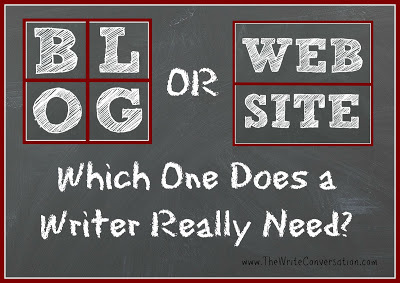Blog or Website—Which One Does a Writer Really Need?
by Edie Melson @EdieMelson
 The reason we do social media is to connect with our audience. And one of the best ways to deepen that connection is by hanging out with them on a blog. Because of that, I’m going to spend the next few weeks on blogging issues.
The reason we do social media is to connect with our audience. And one of the best ways to deepen that connection is by hanging out with them on a blog. Because of that, I’m going to spend the next few weeks on blogging issues.
The first issue I want to talk about is the difference between a blog and a website. It’s important to know the terminology and be able to evaluate exactly what you need for your circumstances. Just like social media, blogging is not a one size fits all proposition.Let me start this discussion by stating—for the record—I’m not against websites. They’re a great thing, but they are a luxury, especially at the beginning of your career. If you already have one, great. Just make sure your site also has the option of blogging on it.
BUT, if you don’t have a site, or you’re thinking of upgrading to a website, these are some things to think about.
So, blog or website—which should a writer have? Today I thought I’d give you an easy way to decide which you should have and begin the evaluation process for your specific situation.
As many of you know, social media and blogging aren’t a one-size-fits-all proposition. Far from it! But the almost endless array of choices can leave anyone feeling uncertain what’s needed.
Before we get into the choices and how to decide, let’s make certain we’re all clear on the definitions.
 A BlogThe word itself is a relatively new invention. Its usage began in the early 80s and comes from the words Web and Log—
Blog
—and was originally envisioned as a sort of online journal. Occasionally I still run across someone who doesn’t realize blogs haven’t been online diaries for many years.
A BlogThe word itself is a relatively new invention. Its usage began in the early 80s and comes from the words Web and Log—
Blog
—and was originally envisioned as a sort of online journal. Occasionally I still run across someone who doesn’t realize blogs haven’t been online diaries for many years.
Having a blog used to be thought of as the amateur way to have an online presence. Again, this hasn’t been the case for quite a number of years. Many well-respected sites are in actuality, blogs.
Enough history, here is an up-to-date definition of a blog:An online site, with regular, frequent updates that encourage interaction through comments and sharing. It can be a single-page site or a multi-page site. But its primary purpose is interaction.
 A WebsiteIn contrast, a website is much more of a static site, where much of the information remains the same. It doesn’t usually have a place for interaction—although there is almost always a contact form somewhere so visitors can interact if necessary. It's almost like a yellow pages ad or a billboard.
A WebsiteIn contrast, a website is much more of a static site, where much of the information remains the same. It doesn’t usually have a place for interaction—although there is almost always a contact form somewhere so visitors can interact if necessary. It's almost like a yellow pages ad or a billboard.
A website can also be a singe-page or a multi-page site. But more generally it has several pages. Often times, one of the pages is a blog. Websites are most often built by website designers or those willing to learn HTML code. Even though a lot of folks use a template to build a website, they are almost always customized and use a lot more code specific design.
As you can see by the definitions, blogs and websites do tend to overlap in their intent. But, and this is VITALLY important to understand, they are not the same in the way they’re developed.
Take WordPress products for example. WordPress has a lot of great options, for blogs and for websites. But, blogs are built on the WordPress.com site, and websites are built on the WordPress.org site. Why two different sites? Because websites and blogs are very different in the way they’re constructed.
Think of WordPress like a car company—say Volkswagen. Even though the VW Bug and the Jetta are both built by Volkswagen, they are very different cars. A mechanic doesn’t fix them with the same parts or even necessarily the same tools. It’s the same for WordPress Blogs (the free version .com) and WordPress Websites (the paid version .org). Even more than that, just because someone has their own WordPress website doesn’t mean they know how to help you with WordPress blog. Be very careful here, the plug-ins are not always the same!
Generically speaking, a blog isn’t better than a website and visa versa. But specifically, there are times when one choice is better than another.
When to Build only a BlogI recommend new writers always start with a blog and here are some reasons why: When is it time to build only a blog?They’re easy to work with. By that I mean, it’s easy to learn the basics if you stick with a reputable platform. I recommend Blogger, WordPress, or TypePad.They’re free. Blogger is completely free. WordPress.com is free, but also has some upgrades available for purchase. And TypePadhas a small monthly fee, depending on which version you choose. It may surprise you to know that my favorite, hands down, is Blogger. Blogger offers more options for personalization and it has the added benefit of being owned by Google, so you get good search engine results if your site is well done.They can be tweaked and changed as your career grows and focuses. Just because you begin writing devotions, doesn’t mean you won’t one day end up writing fiction. It helps if you don’t have to start over and build a whole new product.
When is it time to build only a blog?They’re easy to work with. By that I mean, it’s easy to learn the basics if you stick with a reputable platform. I recommend Blogger, WordPress, or TypePad.They’re free. Blogger is completely free. WordPress.com is free, but also has some upgrades available for purchase. And TypePadhas a small monthly fee, depending on which version you choose. It may surprise you to know that my favorite, hands down, is Blogger. Blogger offers more options for personalization and it has the added benefit of being owned by Google, so you get good search engine results if your site is well done.They can be tweaked and changed as your career grows and focuses. Just because you begin writing devotions, doesn’t mean you won’t one day end up writing fiction. It helps if you don’t have to start over and build a whole new product.
When to Build a Website (with a blog in it)I recommend an author with multiple books, and the means to pay someone to keep it up, invest in a website…with a blog. Now don’t get me wrong, I know a lot of writers who’ve built their own websites. Some of them like to tinker with code (not many) others just want to save money. Personally, my passion is writing, NOT website building.
Here are the reasons to build a website: When is it time to build a website with a blog?You are more than one person, commercially speaking. For example, my friend and critique partner Vonda Skelton, is an author, a motivational speaker, an actress, and a womens ministry leader. She needs a website to have multiple pages under each of the four categories.You’re ready to have someone else run that part of your business and can afford to pay for it. Make sure you have someone who comes highly recommended and who has time to make changes you need in a reasonable time-frame.You have multiple books and need more room to promote/engage your readers.
When is it time to build a website with a blog?You are more than one person, commercially speaking. For example, my friend and critique partner Vonda Skelton, is an author, a motivational speaker, an actress, and a womens ministry leader. She needs a website to have multiple pages under each of the four categories.You’re ready to have someone else run that part of your business and can afford to pay for it. Make sure you have someone who comes highly recommended and who has time to make changes you need in a reasonable time-frame.You have multiple books and need more room to promote/engage your readers.
All of that said, even the biggest and best websites can benefit from having a blog somewhere within the site. In today’s publishing climate readers like to engage with authors. At this point, a blog is still the best way to do it.
Now it’s your turn. I’m going to cover a lot of blogging issues in the next few weeks and I want to make sure I get to the things that you want to know about. Please leave some things you’d like to see covered in the comments section below.
Don’t forget to join the conversation!Blessings,Edie
TWEETABLES
#Blog or #Website - it's not a one-size-fits-all proposition for writers - @EdieMelson (Click to Tweet)
#Blog or #Website? The choice must fit a writer's personal situation - @EdieMelson (Click to Tweet)
If you've missed the previous posts in this series on Social Media Basics for Writers, here they are:
Part I—Know Where You are and Where You’re GoingPart II—When Should a Writer Start Building a Social Media NetworkPart III—Targeting Millennials: Snapchat’s 3 Most Dominant Brands & Their Tactics Part IV—Dealing with Facebook SpamPart V—How to Use Hashtags in Social Media
Part VI—Is Twitter Worth the Bother?
Part VII—Get Started with Hootsuite
Part VIII—Tips for Composing Effective Social Media Updates
Part IX—What Do I Say On Social Media? 23 Conversation Starters for Authors
Part X—Tips to Help Writers Get More Twitter Followers
Part XI—Do You Have Unrealistic Expectations for Social Media?
 The reason we do social media is to connect with our audience. And one of the best ways to deepen that connection is by hanging out with them on a blog. Because of that, I’m going to spend the next few weeks on blogging issues.
The reason we do social media is to connect with our audience. And one of the best ways to deepen that connection is by hanging out with them on a blog. Because of that, I’m going to spend the next few weeks on blogging issues. The first issue I want to talk about is the difference between a blog and a website. It’s important to know the terminology and be able to evaluate exactly what you need for your circumstances. Just like social media, blogging is not a one size fits all proposition.Let me start this discussion by stating—for the record—I’m not against websites. They’re a great thing, but they are a luxury, especially at the beginning of your career. If you already have one, great. Just make sure your site also has the option of blogging on it.
BUT, if you don’t have a site, or you’re thinking of upgrading to a website, these are some things to think about.
So, blog or website—which should a writer have? Today I thought I’d give you an easy way to decide which you should have and begin the evaluation process for your specific situation.
As many of you know, social media and blogging aren’t a one-size-fits-all proposition. Far from it! But the almost endless array of choices can leave anyone feeling uncertain what’s needed.
Before we get into the choices and how to decide, let’s make certain we’re all clear on the definitions.
 A BlogThe word itself is a relatively new invention. Its usage began in the early 80s and comes from the words Web and Log—
Blog
—and was originally envisioned as a sort of online journal. Occasionally I still run across someone who doesn’t realize blogs haven’t been online diaries for many years.
A BlogThe word itself is a relatively new invention. Its usage began in the early 80s and comes from the words Web and Log—
Blog
—and was originally envisioned as a sort of online journal. Occasionally I still run across someone who doesn’t realize blogs haven’t been online diaries for many years.Having a blog used to be thought of as the amateur way to have an online presence. Again, this hasn’t been the case for quite a number of years. Many well-respected sites are in actuality, blogs.
Enough history, here is an up-to-date definition of a blog:An online site, with regular, frequent updates that encourage interaction through comments and sharing. It can be a single-page site or a multi-page site. But its primary purpose is interaction.
 A WebsiteIn contrast, a website is much more of a static site, where much of the information remains the same. It doesn’t usually have a place for interaction—although there is almost always a contact form somewhere so visitors can interact if necessary. It's almost like a yellow pages ad or a billboard.
A WebsiteIn contrast, a website is much more of a static site, where much of the information remains the same. It doesn’t usually have a place for interaction—although there is almost always a contact form somewhere so visitors can interact if necessary. It's almost like a yellow pages ad or a billboard.A website can also be a singe-page or a multi-page site. But more generally it has several pages. Often times, one of the pages is a blog. Websites are most often built by website designers or those willing to learn HTML code. Even though a lot of folks use a template to build a website, they are almost always customized and use a lot more code specific design.
As you can see by the definitions, blogs and websites do tend to overlap in their intent. But, and this is VITALLY important to understand, they are not the same in the way they’re developed.
Take WordPress products for example. WordPress has a lot of great options, for blogs and for websites. But, blogs are built on the WordPress.com site, and websites are built on the WordPress.org site. Why two different sites? Because websites and blogs are very different in the way they’re constructed.
Think of WordPress like a car company—say Volkswagen. Even though the VW Bug and the Jetta are both built by Volkswagen, they are very different cars. A mechanic doesn’t fix them with the same parts or even necessarily the same tools. It’s the same for WordPress Blogs (the free version .com) and WordPress Websites (the paid version .org). Even more than that, just because someone has their own WordPress website doesn’t mean they know how to help you with WordPress blog. Be very careful here, the plug-ins are not always the same!
Generically speaking, a blog isn’t better than a website and visa versa. But specifically, there are times when one choice is better than another.
When to Build only a BlogI recommend new writers always start with a blog and here are some reasons why:
 When is it time to build only a blog?They’re easy to work with. By that I mean, it’s easy to learn the basics if you stick with a reputable platform. I recommend Blogger, WordPress, or TypePad.They’re free. Blogger is completely free. WordPress.com is free, but also has some upgrades available for purchase. And TypePadhas a small monthly fee, depending on which version you choose. It may surprise you to know that my favorite, hands down, is Blogger. Blogger offers more options for personalization and it has the added benefit of being owned by Google, so you get good search engine results if your site is well done.They can be tweaked and changed as your career grows and focuses. Just because you begin writing devotions, doesn’t mean you won’t one day end up writing fiction. It helps if you don’t have to start over and build a whole new product.
When is it time to build only a blog?They’re easy to work with. By that I mean, it’s easy to learn the basics if you stick with a reputable platform. I recommend Blogger, WordPress, or TypePad.They’re free. Blogger is completely free. WordPress.com is free, but also has some upgrades available for purchase. And TypePadhas a small monthly fee, depending on which version you choose. It may surprise you to know that my favorite, hands down, is Blogger. Blogger offers more options for personalization and it has the added benefit of being owned by Google, so you get good search engine results if your site is well done.They can be tweaked and changed as your career grows and focuses. Just because you begin writing devotions, doesn’t mean you won’t one day end up writing fiction. It helps if you don’t have to start over and build a whole new product.When to Build a Website (with a blog in it)I recommend an author with multiple books, and the means to pay someone to keep it up, invest in a website…with a blog. Now don’t get me wrong, I know a lot of writers who’ve built their own websites. Some of them like to tinker with code (not many) others just want to save money. Personally, my passion is writing, NOT website building.
Here are the reasons to build a website:
 When is it time to build a website with a blog?You are more than one person, commercially speaking. For example, my friend and critique partner Vonda Skelton, is an author, a motivational speaker, an actress, and a womens ministry leader. She needs a website to have multiple pages under each of the four categories.You’re ready to have someone else run that part of your business and can afford to pay for it. Make sure you have someone who comes highly recommended and who has time to make changes you need in a reasonable time-frame.You have multiple books and need more room to promote/engage your readers.
When is it time to build a website with a blog?You are more than one person, commercially speaking. For example, my friend and critique partner Vonda Skelton, is an author, a motivational speaker, an actress, and a womens ministry leader. She needs a website to have multiple pages under each of the four categories.You’re ready to have someone else run that part of your business and can afford to pay for it. Make sure you have someone who comes highly recommended and who has time to make changes you need in a reasonable time-frame.You have multiple books and need more room to promote/engage your readers. All of that said, even the biggest and best websites can benefit from having a blog somewhere within the site. In today’s publishing climate readers like to engage with authors. At this point, a blog is still the best way to do it.
Now it’s your turn. I’m going to cover a lot of blogging issues in the next few weeks and I want to make sure I get to the things that you want to know about. Please leave some things you’d like to see covered in the comments section below.
Don’t forget to join the conversation!Blessings,Edie
TWEETABLES
#Blog or #Website - it's not a one-size-fits-all proposition for writers - @EdieMelson (Click to Tweet)
#Blog or #Website? The choice must fit a writer's personal situation - @EdieMelson (Click to Tweet)
If you've missed the previous posts in this series on Social Media Basics for Writers, here they are:
Part I—Know Where You are and Where You’re GoingPart II—When Should a Writer Start Building a Social Media NetworkPart III—Targeting Millennials: Snapchat’s 3 Most Dominant Brands & Their Tactics Part IV—Dealing with Facebook SpamPart V—How to Use Hashtags in Social Media
Part VI—Is Twitter Worth the Bother?
Part VII—Get Started with Hootsuite
Part VIII—Tips for Composing Effective Social Media Updates
Part IX—What Do I Say On Social Media? 23 Conversation Starters for Authors
Part X—Tips to Help Writers Get More Twitter Followers
Part XI—Do You Have Unrealistic Expectations for Social Media?
Published on August 31, 2015 01:00
No comments have been added yet.



